Insights from the Holy Quran on Faith, Ethics, and Social Harmony
Introduction
For centuries, the Holy Quran has stood as the unwavering guide for the entire Muslim community, offering comprehensive wisdom on matters of faith, spirituality, ethics, and social conduct. Rooted in its profound teachings, the Quran provides not only spiritual enlightenment but also serves as a beacon for social supervision. In essence, it encapsulates the essence of an all-encompassing moral compass, deeply interwoven with the fabric of Islamic principles. This article embarks on a journey to delve into the most pivotal aspects of human existence, forging an unbreakable connection between these facets and the teachings of Islam, as revealed in the Holy Quran.
Within the pages of the Quran, one discovers the ethical framework that transcends the boundaries of time and place. It imparts invaluable lessons on how individuals should navigate their roles within the family and the broader community. As we explore the profound wisdom of the Quran, we unearth its potential to shape not only individual lives but also the collective conscience of society.
Familial Rights
In Islam, there's a strong emphasis on leading a fulfilling social life through love, kindness, good behavior, charity, warm greetings, smiles, humility, and more. These are clear signs of how the teachings of Islam encourage strong social bonds among its followers. Islam instructs men to come together and strengthen their unity five times a day when they pray in congregation, called ‘Salat with Jamat,’ in mosques. This daily practice fosters a sense of togetherness and unity in the community.
Quran stands in the daylight performing the immense importance to the society whose staple fundamental institution is family, which helps the society be prosperous, healthy and socially bonded with each other.[1] Quran brings forth the reward for one who has a good and strong social bond with his family members which is just through the compassion, kindness, sympathy, care, concerns, gentleness, benevolence, and love with spouse, children, primary and secondary kin which are the core principle of humanity.
In numerous verses, Almighty Allah proclaimed the duties, responsibilities and rights of family members towards one another. For instance, the men are obligated to care for them economically from giving well costumes, noble household to live with, equitable food to dine and to fulfil her needs. Allah the Almighty said in this concept of nafaqah: “But he shall bear the cost of their food and clothing on equitable terms. No soul shall have a burden laid on it greater than it can bear.”[2] The parents are obligated to nurture the children, when they turned 7, parents are encauraged to compel them for prayers and even to punish them if they avoid prayers after they are 10, and reversely, children are obliged to respect their parents, perform their working and aiding and to obey their all advices, as Quran ordained: “Thy Lord hath decreed that ye worship none but Him, and that ye be kind to parents. Whether one or both of them attain old age in thy life, say not to them a word of contempt, nor repel them, but address them in terms of honour.”[3]
Community and Brotherhood
Islam establishes the concept of one single community and that’s what we call it Ummah. It never became bound to the boundaries of one nation or one state but to the global-level, each Muslim is under the definition of Ummah.[4] It encourages the sense of brotherhood, as Prophet Muhammad ﷺ proclaimed: "The believers in their mutual kindness, compassion and sympathy are just like one body. When one of the limbs suffers, the whole body responds to it with wakefulness and fever".[5]
Within the community of Islam across the world, each Muslim is a brother of another Muslims, each Muslim girl is the sister of another Muslim. This is the concept of brotherhood, which never is all about the biological brotherhood, ties the universal Muslim community into its single rope of unity. It promotes social justice and equality among the Muslims. In fact, the final message that the Messenger of Allah ﷺ delivered underscoring the concept of ummah included “An Arab has no virtue over a Non Arab, nor does a Non Arab have virtue over an Arab, a red skinned person is not more virtuous than a dark skinned person nor is a dark skinned person more virtuous than a red skinned person except through Taqwa.”[6]
Justice and Equality
One of the core teachings enshrined within the Holy Quran is the resounding call for equality and equity among all people. A striking example of this principle is evident in the practice of Muslims praying shoulder to shoulder in the same rows within the mosque. It's a place where the wealthy king or the influential CEO stands alongside the humble and destitute, connecting with the divine presence of Allah the Almighty. The Quranic teachings place a paramount emphasis on establishing justice in human interactions and decision-making processes, impartial to personal interests, biases, preconceptions, or prejudices. This unwavering commitment to justice stands as a defining hallmark of the Quran's wisdom. In the Holy Quran, Allah proclaimed: O ye who believe! stand out firmly for justice, as witnesses to Allah, even as against yourselves, or your parents, or your kin, and whether it be (against) rich or poor: for Allah can best protect both. Follow not the lusts (of your hearts), lest ye swerve, and if ye distort (justice) or decline to do justice, verily Allah is well-acquainted with all that ye do.[7]
The Quran's verses and Hadiths underscore the profound dedication to justice, not confined to a single domain but extending its reach into various aspects of life. It touches upon legal cases, financial transactions, and social connections, ensuring that fairness and equality are the cornerstones of all human interactions. Upholding the rights of individuals, fulfilling one's responsibilities, and rewarding acts of goodness are pivotal elements within this framework. In our contemporary context, one of the most pertinent dimensions of justice and equality pertains to gender equality. The Quranic verses and Hadiths provide a strong foundation for promoting the equitable treatment of women and upholding their rights in society.[8] In the Qur'an, there aren't specific jobs for men and women, but it suggests that both genders play important roles in the family. For instance, the verse of Surah Adh-Dhariyat signifies that the objective of human creation, including both the genders male and female, in this world is nothing but to worship the Creator, Allah the Almighty, saying: “I have only created Jinns and men, that they may serve Me.”[9] The differentiation that could be seen in ruling and roles are of different discussion and under various wisdoms, which are to be separately dealt with.
Social Welfare and Compassion
Compassion, charity, and social welfare are deeply rooted in the teachings of Islam. The Quran and Hadith emphasize the importance of these values, encouraging Muslims to extend a helping hand to the needy, promote charitable giving, and foster a culture of social welfare.
In Islam, giving charity and aiding others, whether in economic or monetary terms, is highly regarded. This practice is rooted in the understanding that all wealth comes from Allah, and it is He who bestows abundance upon His believers. At the same time, it's essential to recognize that Allah can take away this wealth, underscoring the significance of using one's resources for charitable and altruistic purposes.[10] The Quran in Surah Al-Baqara (2:261-267) illustrates that charitable acts are greatly rewarded by Allah, emphasizing the generosity of giving.
Supporting widows and orphans is a vital aspect of Islamic teachings. Whether it's offering economic support or emotional care, Islam places a strong emphasis on ensuring the well-being and dignity of widows. The Quran highlights the importance of supporting orphans, drawing attention to the Prophet Muhammad's ﷺ own experience as an orphan. The verses in Surah Al-Duha: “So do not oppress the orphan, nor repulse the beggar.”[11] the Quran reminds believers of the compassion and guidance that Allah provided to the Prophet Muhammad ﷺ during his time of need.
For those blessed with ample wealth, Islam obligates the giving of alms, or zakat, to fulfill the rights of those living below the Islamic poverty line. This practice serves to distribute wealth equitably within the Muslim community and is a crucial element of social welfare. The Quran reinforces this obligation in Surah Al-Baqarah O believers! Donate from the best of what you have earned and of what We have produced for you from the earth. Do not pick out worthless things for donation, which you yourselves would only accept with closed eyes. And know that Allah is Self-Sufficient, Praiseworthy,[12] emphasizing the need to spend from one's earnings and the resources provided by Allah to support those less fortunate.
Conflict Resolution and Peace
Islam, whose very name means "peace," is inherently a religion that guides its followers toward a state of tranquility. In the context of the Muslim community, conflicts without the pleasure and guidance of Allah the Almighty are not permissible. Central to Islamic principles is the concept that conflict resolution is not only a virtuous endeavor but a critical component that nurtures social bonds among Muslims. Islam places a profound emphasis on peaceful conflict resolution through negotiations and peaceful dialogues. Violence and aggression, which often result in unnecessary harm and discord, are not only discouraged but are frequently prohibited and forbidden in Islamic teachings.
The Quran and Hadith offer numerous verses and hadiths of the Prophet Muhammad ﷺ that underscore the importance of peaceful conflict resolution. For example, the verse And if two groups of believers fight each other, then make peace between them. But if one of them transgresses against the other, then fight against the transgressing group until they ˹are willing to˺ submit to the rule of Allah. If they do so, then make peace between both ˹groups˺ in all fairness and act justly. Surely Allah loves those who uphold justice.[13] the Quran explicitly highlights the significance of reconciling disputes among believers and encourages just resolution.
Conflict resolution within Islam also leads to seeking forgiveness and extending pardons. Forgiveness is considered one of the most virtuous actions a Muslim can take. Despite human beings being inherently prone to sin, Allah the Almighty calls upon us to seek forgiveness with a pure heart and sincere realization of our mistakes, knowing that He is Forgiving and Merciful. The verse Then go forth with the rest of the pilgrims. And seek Allah’s forgiveness. Surely Allah is All-Forgiving, Most Merciful.[14] emphasized that seeking forgiveness and recognizing one's faults are integral to the resolution of conflicts.
Conclusion
In conclusion, the Holy Quran is not just a religious text; it's a comprehensive guide for life. It offers wisdom on faith, morals, and social behavior, connecting the teachings of Islam with our daily lives. It reminds us of the importance of family bonds, where love, kindness, and togetherness play a crucial role. The Quran highlights the concept of one united community, promoting brotherhood and equality among all Muslims. Justice and fairness are central themes, ensuring that all people are treated with respect and impartiality. Finally, compassion and social welfare are core values, encouraging Muslims to help those in need and create a more caring society. Conflict resolution and peace are also key principles, reminding us to resolve disputes peacefully and seek forgiveness for our wrongs.
The Quran's teachings are not confined to any specific time or place; they are timeless and universal, offering guidance for a harmonious and morally upright life. It reminds us to be compassionate, just, and kind in our interactions, fostering a sense of unity and understanding among all of humanity.[15] These teachings stand as a beacon of light, illuminating the path to a better world, where love, peace, and justice prevail.
Endnotes
[1] Al-ʻāṭī, Ḥammūdah ʻAbd. The Family Structure in Islam. [s.l.]: American Trust Publications, 1977.
[2] Holy Quran: 02/233
[3] Holy Quran: 17/23
[4] Denny, Frederick Mathewson. Islam and the Muslim Community, 1998.
[5] Riyad as-Salihin 224, h.224
[6] Musnad Ahmad, vol. 5 pg. 411
[7] Holy Quran: 04/135
[8] Utas, Bo. Women in Islamic Societies. Routledge, 2016.
[9] Holy Quran: 51/56
[10] Younos, Farid. Principles of Islamic Sociology. Author House, 2011
[11] HOly Quran: 93:9-10
[12] HOly Quran: 2:267
[13] Holy Quran: 49:9
[14] Holy Quran: 02/199
[15] Ramadan, Tariq. The Messenger: The Meanings of the Life of Muhammad, 2007.
Endnotes
Zainul Abedin is a second year student of the Department of Civilizational Studies at Darul Huda Islamic University, Kerala, India. His areas of interest include fiction, non-fiction, academic, content-writing, research papers, stories, poems, and articles.
Disclaimer
The views expressed in this article are the author’s own and do not necessarily mirror Islamonweb’s editorial stance.

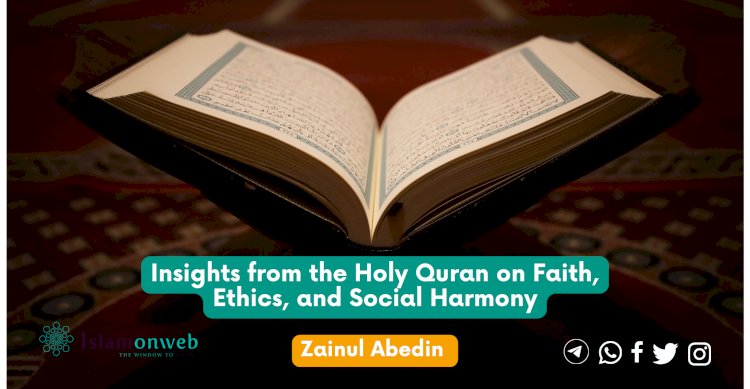


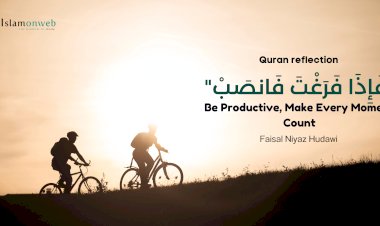
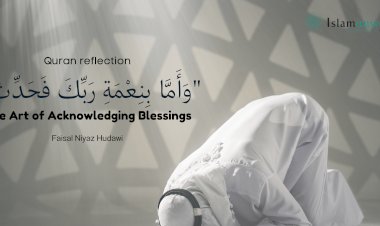
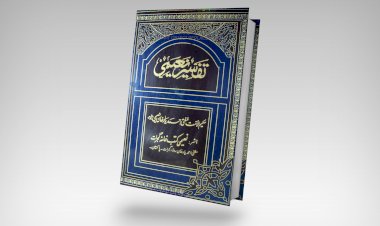
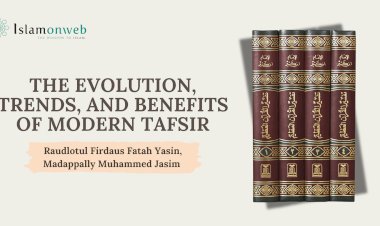

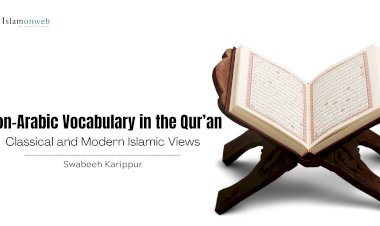














Leave A Comment